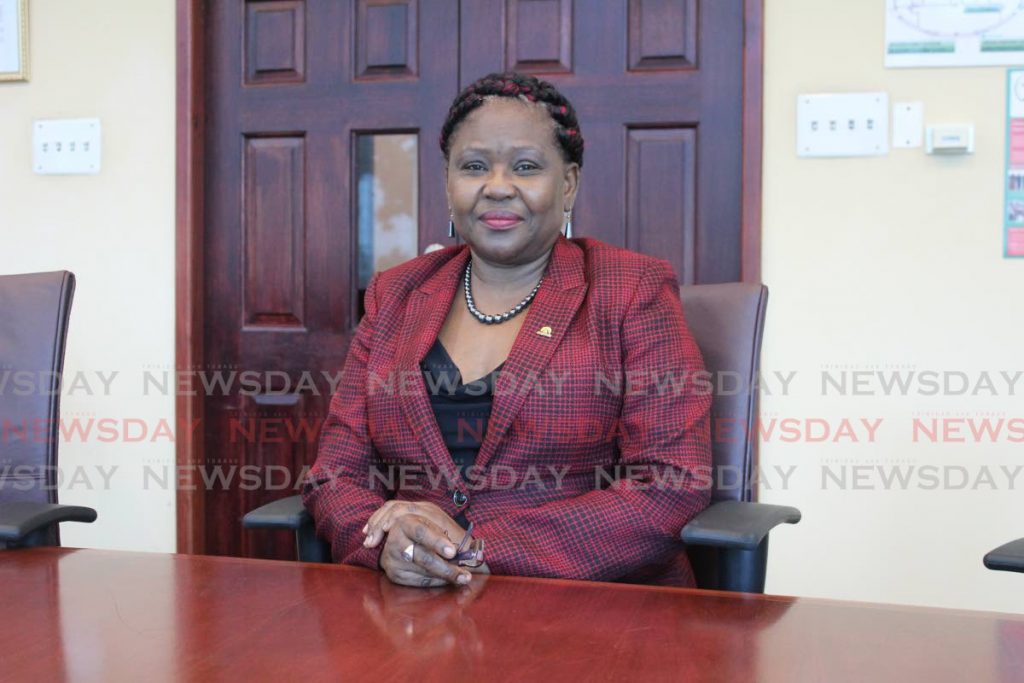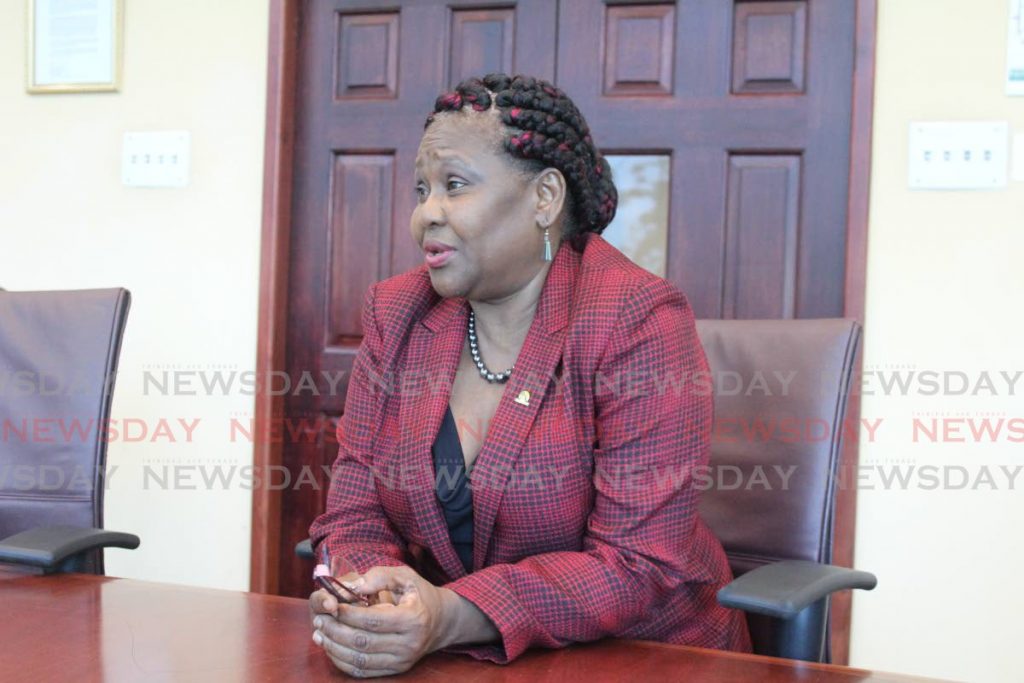Janice Johnson-Lorde: advocate for workers' rights

Janice Johnson-Lorde hates injustice. She abhors the inefficiencies and gaps in administrative policies that breed inequality, inequity and unfairness. And she’s never been any good at hiding her feelings. So it was inevitable that she’d become a passionate advocate for workers’ rights and now, a lecturer and consultant in industrial relations.
“I believe IR is life. If you can take the concepts of industrial relations and (apply it) to what you do, you will (learn to) take into account both sides of any situation,” she told WMN recently.
It’s core to her ethos, from her days as an industrial relations officer at the Prisons’ Association, policy adviser and now, consultant and lecturer at the Cipriani College of Labour and Co-Operative Studies. Even though industrial relations is primarily concerned with workers’ rights in the workplace, Johnson-Lorde notes that management’s issues with employees have to be considered as well because both outlooks need to be taken into account if a system is to succeed.
“So, I see myself straddling contemporary industrial relations as opposed to the traditional approach in terms of the worker gets what the worker wants at any cost. That doesn't make sense.”
Johnson-Lorde’s first foray into industrial relations was accidental, but given her bold personality, not unexpected. As a young prisons officer, she attended a meeting where working conditions were being raised.
“I found all I was hearing were issues relating to men and the men’s prisons, even though the women’s prisons had its own concerns,” she recalled.
She looked over at her representative and some of the other women present and after realising none of them were going to say anything, she stood up for herself.
“I was speaking on my own behalf not anyone else’s. These were the concerns that were affecting me personally so I raised them.”
She didn’t think much of it until the then head of the Prisons Association, Michael Molino, approached her afterwards and asked her if she was interested in industrial relations.
“I said ‘what was that?’ He said, ‘fill out this form. You’ll find out. You seem to be IR already without even knowing it.'”
So, she signed up and the association sent her to Cipriani’s ten-Saturday introductory course in industrial relations. She fell in love.
“I moved straight through to the associate’s degree after. And I never stopped.”

She quickly realised what Molino saw immediately – she had a knack, a natural tenacity for IR but she needed a foundation. After her associate’s degree, she went on to study human resource management, to learn the nuances of negotiations from the management side (and she realised how unfair it was that people in HR could sit in IR courses but not vice versa, so she wanted to be as well armed with knowledge). She then did a diploma in law and an MBA.
She eventually accepted a role as industrial relations officer at the Prisons Association, where she started as part of a research team for negotiations, although she found it a bit boring. She started lobbying the government for housing for officers and was among the founders of the Joint Protective Services Housing Association. She was also part of the team that drafted the national security strategy. Over 14 years, she kept learning, honing her skills in almost every facet related to IR – even insurance claims. She was also seconded to IR consultant Bernard St Louis as a junior consultant, working with him even today – although certainly no longer a junior. When she eventually retired from the Prisons Association in 2018, she was the senior facility researcher and development training instructor.
“I found that serving was really what I was called to do – meeting people's needs and solving them. It has been a very enjoyable experience.”
Not one to sit still, almost immediately after her retirement, she joined Cipriani as a lecturer in collective bargaining, politics and government in the Caribbean, and industrial relations.
Seeing both sides
Policy development, Johnson-Lorde said, is really about governing behaviour – not just of workers but within the organisation as a whole.
“We tend to feel a policy is only for subordinates but policies in an institution is for everybody. The courts will tell you that. People will say do as I say not as I do. That does not apply in the workplace.”
Take masks, for example. A policy saying masks must be worn to enter the compound must be applied to everyone.
“As a matter of fact, you expect leadership to lead because there you will find moral authority.”
Johnson-Lorde’s philosophy is simple, and echoes the biblical golden rule but is grounded in the works of German philosopher Immanuel Kant.
“'Let that which you do become the universal maxim.’ It simply means that even if you're in a minority, and something can impact you negatively, the rest of us must take that into account. We go about our lives saying the greatest good for the greatest number of people and we are hurting people all the time. If you are going to do something to somebody you be certain that you are prepared for it to be done to you.”
Her approach to IR then, is to make it relatable.

“As an employee today, you might have all the reasons for why management should allow you leeway but when you become a manager what happens when the employee is doing just what you do? That’s why you don’t teach principles in a vacuum. You teach it in a way that people can relate: if it were you what would you do. And in that way, you tend to get people understanding a bit clearer.”
In her training, she often suggests role play, allowing the worker or manager to look at things, negotiations, for example, from the other’s perspective. In collective bargaining, there might be demands, but they may not always be reasonable or redound to the benefit of the whole.
“This speaks to the issue of empathy, which is lacking in most of us because we want what we want and we don't really stop to contemplate the true cost of it. I want people to have a social mind set. When we think about it, it’s not just this one group, win or lose, but how can we function in such a way to benefit all the interests.”
Women in the workplace
While Johnson-Lorde’s own experience as a woman in the workplace standing up for her rights was the catalyst for her journey into IR, she believes that in some ways, women have grown accustomed to fighting and continue to fight, even when there’s no reason.
“Rather than occupy our own unique place and space, we tend to believe we have to act and behave like a replacement. And I think there's room for both of us (men and women). There are things men might be able to do better and things women can do better and we ought to be able to complement and supplement each other rather than compete.”
There is definitely a role for women, she said, but women need to be trained to compartmentalise and understand that the way they manage a household is not the way to operate in a workplace and emotions can be destructive. Too many decisions are made emotionally, Johnson-Lorde said. And while it may seem a bit stereotypical and sexist, the court records support it.
“If you look at judgements in the Industrial Court, more than 65 per cent of erroneous decisions were made by women managers. It was startling to see it.”
Sometimes women react as if they have something to prove instead of the merit of the case, she said. So, while women do need to be empowered, they (and men) also need to be trained to manage emotional responses.
“We don't have to push the door down anymore. We are at the table with the men. We have to show we have value to add to the process so they listen. We don’t have to scream, shout, curse or otherwise behave like them. We have to bring what is uniquely us because if we act just like the men then that makes us redundant.”
Industrial relations climate
The industrial relations climate right now, she said, if not managed properly, can revert to the watershed period of the 1930s – a pivotal moment in TT’s labour history. Several employers, she has observed, are using the current covid19 pandemic as an opportunity to exploit workers.
“This will only create rebellion. So we have to decide if we are going to put profits before people. And if we understand, if we are wise businessmen, we will always put people before profit because we will understand people bring us profit.”
In terms of tripartite relationships – labour, employers and government, Johnson-Lorde has no qualms holding the government to account for the way it interacts as a regulator and mediator.
“This is an election year so the very issue of tripartite will find itself skewed. Because the reality is the government will be thinking, okay we want to win the election to stay in power. Who do we need to please to achieve that objective?”
Each element of that tripartite triangle has its own agenda: government wants to be re-elected; business finances campaigns – but the employees are the ones whose votes are needed to win.
“Government is in a precarious position. No matter how many millions a businessman might have, it’s only one vote. They need the thousands of votes from workers. Government then will try to balance these interests, trying to please everyone. And then if they get back into power, perhaps implement a tax regime and cost cutting to fill that finance gap.”
But the vicissitudes of elections and covid19 highlight the question of if the legislative framework currently in existence is enough to protect the employee.
“Trade union associations are well-minded to look at the legal frameworks and see where the gaps are that would have prevented employers (from exploiting) workers. We seem to believe that those workers who are not unionised do not need social protection. They do.”
The field of industrial relations tends to get labelled as trade unionism, she said, but it’s so much more than that.
“Industrial relations is about the fundamental rights of working people. I consider myself a working person. So, this is not something I would leave behind. I see myself as a change agent. There are people who like to complain but if there’s a problem you should at least have a suggestion on how to alleviate it. I love what I do. I believe in what I do. That’s Mrs Johnson-Lorde in a nutshell.”


Comments
"Janice Johnson-Lorde: advocate for workers’ rights"